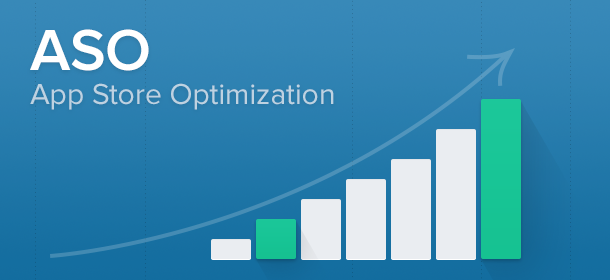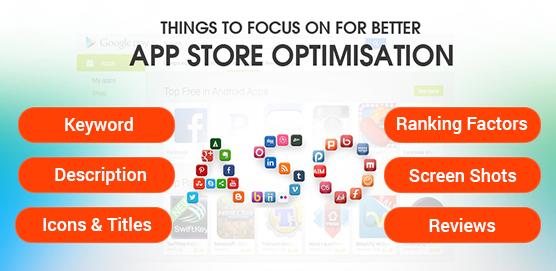
Even though you've developed an excellent mobile app, it needs an impressive ranking for better visibility. Therefore, you need to be a bit strategic about app store optimization to bring a targeted audience to your webpage. A leading research agency unfolded that in 2012 there were 1.2 billion app users, and the number is all set to reach 4.4 billion by 2017. The research further added that in the year 2013, 82 billion apps were downloaded, and that could be jumped up to 200 billion by 2017.
What is App Store Optimization (ASO)
Let's begin with this -
ASO, App Store Optimization is a process of optimizing mobile apps for greater viability in app stores. The more an app ranks higher the more is its chance to be visible to the potential users. Increased visibility, then translates into huge traffic to your app’s page on the app store.
Unarguably, ASO aims at bringing more buyers to your app page enabling them to take specific actions like downloading an app or writing recommendations.
Factors that Increase Rankings and Improve App Downloads
1. Optimize Your App Store Listing
Since listing in app stores is the only organic way to get your app discovered, you should have a ready ASO plan for the purpose. Like standard SEO, ASO or App Store Optimization also contributes to visibility. To start, create a beautiful logo and a name for the app. It’s important as it will pull the attention of your target audience.
Use relevant keywords in the app title and description to help app stores identify and categorize your app with ease. Google’s app store allows only 50 characters in the title field whereas Apple’s App Store lets you include a subtitle if adding keywords exceeds the character limit.
Google even allows app marketers to use a short description field that accommodates 80 characters and a long description page with a 4000 characters limit. It’s recommended to use relevant keywords in these places to explain the app’s features, functionalities, and benefits.
2. Run Facebook Ad Campaigns
Though ASO is an excellent way to get your mobile app discovered, you can’t solely rely on this. Stretch further and plan paid marketing campaigns, especially on Facebook. Create a Facebook brand page for your mobile app and start running paid campaigns right there. Use custom call-to-action buttons to engage more people and increase the number of downloads.
In the Facebook manager ad, you can set the campaign objective. Choose app installs or app engagement (traffic) from the option. It’s easy to set up a Facebook ad campaign via the Ads Manager. Here you can select a target audience, budget, bid, creative format, and other options. When the campaign is launched and running, measure ad performance, track engagement data, and gain analytics insights using Facebook analytics.
3. Implement a Reward System
Incentivizing users can increase app downloads at scale. But it will work only if your app already has a great reach and authority. In-app rewards are of multiple types and can facilitate engagement. You may incentivize users by offering them unlockable customization options, discounts, push notifications, and in-app currency (points, coins, etc.) features.
The reward system should be focused on encouraging some sort of motivation whether it is to increase user retention, improve app publicity, or get positive app reviews.
In addition to the in-app incentives, you can also initiate actions that can help publicize your mobile app. To entice users you can offer attractive discounts and other lucrative benefits to the users referring or recommending your mobile app. You can also offer users coupons or other cash back for writing reviews of your app on the store.
4. Run App Marketing Campaigns
Want to gain publicity for your mobile apps? Focus on search engines. Search engines contribute to most of the organic searches made online. If your app is discoverable in search engines, its number of downloads will skyrocket. But to secure high rankings in organic rankings you need to have a consistent content marketing plan.
Start a blog around your mobile app to highlight the benefits of your app. Engage your audience there with regular updates. Tell them how they can get the most out of these apps. Content marketing can help you make your mobile app visible and valuable.
But merely publishing random posts won’t be of much help. Instead, perform deep keyword research to find the keywords that will help you convert the users. These keywords will act as catalysts and help you rank your blog posts.
Content marketing is beyond blog posts. You may also leverage other content formats as well including newsletters, podcasts, YouTube videos, etc. To rank the posts further try to acquire quality backlinks from authority. There are many ways to get it done. You can use listing websites to list your app. External reviews and guest article mentions are also a good source of high-quality links.
5. Run Screenshot AB Testing
AB testing could help you to make your app an attention grabber. Though no Play Store offers AB testing facilities, you can do it by yourself. Create two separate screenshots of your app to determine which one brings more traffic. Use some of the most popular digital marketing channels to test which screenshot gets the best response. One which grabs the highest traffic will be your trump card.
6. Keep Customers Informed About Updates
Whenever your app gets an update, inform your users. Tell them exactly what the update contains and what it might have in updates to come. Write at least two or three important inclusions that the latest update has. Merely writing 'bug fixes' won't make any help.
7. Optimize App Title And Keywords
Forrester, in research, revealed that almost 65% of apps are discovered through app store searches. Therefore, to make your app searchable, it's extremely important to include relevant keywords in the app title and description.
It however requires a bit of research. Investigate user behavior to find out what the keywords they use to find apps. Once you get a complete list of possible and the most relevant keywords, incorporate them in the title and description.
8. Include Reviews And Recommendations
Besides, the number of downloads, positive reviews, and recommendations are also important for the app's visibility and demand. While acting upon an app, a user reads app reviews to determine if it's the right buy. To make your app rock the app store, request and invite existing customers to write positive recommendations about your product.

Tarun Gupta, CEO of Brainpulse Technologies, is a prolific author and digital marketing specialist. His insightful writings span SEO, content marketing, social media strategy, and email campaigns, offering invaluable expertise to businesses worldwide. Tarun’s contributions continue to shape the digital marketing landscape, guiding success in multiple niches.

March 20th, 2015 at 3:28 am
To add to the above topic, app marketing can really take the social media marketing and mobile marketing route too. Just to add more spice to the discussion.